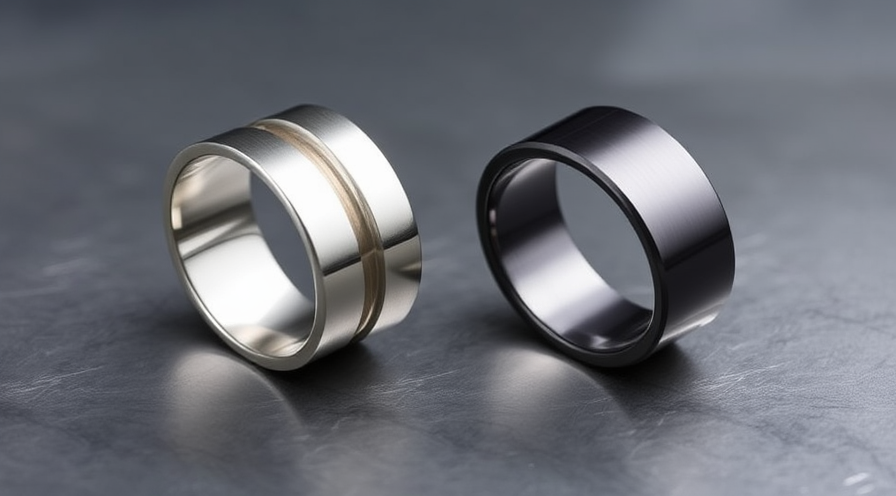Titanium vs. Cobalt Rings: Hypoallergenic Showdown
When it comes to selecting a durable and stylish ring, especially for those with sensitive skin, the choice often narrows down to two popular metals: titanium and cobalt. Both materials offer exceptional strength and modern aesthetics, but their hypoallergenic properties and overall wearability differ significantly. This article explores the titanium vs. cobalt rings debate, focusing on hypoallergenic benefits to help individuals make an informed decision.
Durability and Strength Comparison
Durability is a primary concern when choosing rings, especially for daily wear. Titanium and cobalt rings are both praised for their toughness, but they exhibit distinct characteristics due to their different metal compositions.
Titanium Rings
Titanium is renowned for its impressive strength-to-weight ratio. It is incredibly strong yet exceptionally lightweight, making titanium rings comfortable to wear for extended periods. The metal resists corrosion, scratches, and bending, which contributes to its popularity in jewelry and industrial applications alike.
Its durability ensures the ring retains shape and finish over time, though titanium can show scratches more noticeably compared to cobalt. However, minor scratches can often be buffed out using professional polishing.
Cobalt Rings
Cobalt chrome rings are known for their significant hardness, often compared to tungsten carbide in terms of scratch resistance. This makes cobalt rings incredibly resilient to daily wear and tear, with minimal chances of scratching or dulling.
Additionally, cobalt rings maintain a bright, white shine that resembles platinum. Unlike titanium, cobalt rings feel slightly heavier, which some wearers prefer as it feels more substantial on the finger.
Hypoallergenic Properties and Skin Sensitivity
One of the most critical factors in the titanium vs. cobalt rings discussion is allergy potential. Many people experience allergic reactions to certain metals, especially nickel, which is often found in cheaper jewelry alloys. Understanding the hypoallergenic nature of these metals is vital for sensitive skin.
Hypoallergenic Benefits of Titanium
Titanium is widely regarded as a hypoallergenic metal, making it an excellent choice for those prone to skin allergies. This metal is biocompatible, meaning it does not react adversely with human skin. For decades, titanium has been used in medical implants, underscoring its safety and resistance to causing allergic reactions.
Anyone experiencing redness, itching, or rash from traditional metals like gold or silver is often advised to switch to titanium to eliminate irritation.
Cobalt and Allergy Risks
Cobalt is generally considered hypoallergenic; however, it does contain trace amounts of other metals, including nickel, which can trigger allergic reactions in highly sensitive individuals. The exact alloy composition can vary by manufacturer, so some cobalt rings may pose minor risks to those with metal allergies.
Consumers are advised to verify the nickel content or opt for cobalt rings specifically labeled as "nickel-free" to reduce the chance of allergic responses.
Aesthetic Appeal and Style Variations
While hypoallergenic properties and durability often drive purchasing decisions, the visual aspect of rings plays a crucial role. Titanium and cobalt rings offer distinctive looks that appeal to different tastes.
Design Attributes of Titanium Rings
Titanium rings typically display a sleek, matte finish with a subtle grayish hue. They allow for a variety of design possibilities, including:
- Brushed or polished finishes
- Inlaid wood, carbon fiber, or gemstones
- Custom engravings due to titanium’s metalworking adaptability
The lightweight nature enhances wearer comfort without compromising on modern style or grip.
The New-age Shine of Cobalt Rings
Cobalt rings often feature a brilliant, mirror-like finish that resembles prestigious precious metals like platinum and white gold but at a more affordable price point. Popular features include:
- High polish that retains shine for years
- Resistance to tarnishing and discoloration
- Bolder weight and presence on the finger
This makes cobalt especially appealing to consumers seeking luxury looks without the luxury cost.
Price Point and Maintenance Considerations
Practicality involves not only aesthetics and comfort but also price and upkeep. Titanium and cobalt rings vary in cost and care requirements, impacting long-term ownership satisfaction.
Cost Factors for Titanium Rings
Titanium rings are generally affordable, often costing less than traditional precious metals such as gold or platinum. Prices vary depending on craftsmanship, brand, and inlays.
Maintenance is straightforward but does require occasional polishing to address surface scratches. Importantly, titanium cannot be resized easily, which can be a drawback if finger sizes change over time.
Affordability and Care of Cobalt Rings
Cobalt rings fall within a similar price range to titanium but sometimes trend slightly higher due to their heavier weight and lustrous finish. They rarely require polishing, as the metal resists scratching and tarnishing well.
Though more challenging than gold or silver, minor resizing of cobalt rings is possible, making them somewhat more versatile for size adjustments.
Final Thoughts: Which Hypoallergenic Ring Suits Your Needs?
When evaluating titanium vs. cobalt rings from a hypoallergenic standpoint, titanium emerges as the safest option for those with sensitive skin due to its absolute biocompatibility and nickel-free composition. However, cobalt rings also provide great hypoallergenic qualities for many wearers, with a visually stunning finish and excellent durability.
Choosing the right ring ultimately depends on individual priorities:
- If allergy prevention and ultra-light comfort are paramount, titanium is the superior choice.
- If a high-gloss, heavier feel with strong scratch resistance is preferred, cobalt presents a compelling alternative.
- Both metals offer long-lasting durability, modern design versatility, and affordable pricing compared to precious metals.
Prospective buyers should consider consulting with jewelers to assess allergy risks specifically and review alloy compositions before purchase.
In an increasingly competitive marketplace, titanium vs. cobalt rings continue to lead as top hypoallergenic options. By understanding their unique qualities, consumers can confidently select a ring that perfectly balances health, style, and performance for years to come.
